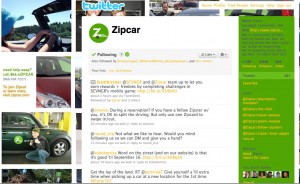 I had a journalism professor who had an interesting philosophy about writing news stories: “Explain it to the reader as if you’re explaining it to a friend at a bar.” That’s more clever than it sounds. What my old prof meant was: keep it simple, brief, and highlight the interesting stuff (you don’t want to bore your friends do you?).
I had a journalism professor who had an interesting philosophy about writing news stories: “Explain it to the reader as if you’re explaining it to a friend at a bar.” That’s more clever than it sounds. What my old prof meant was: keep it simple, brief, and highlight the interesting stuff (you don’t want to bore your friends do you?).
This weekend I was explaining social media success stories to a friend in the media. In that short conversation, I summed up the three big strategies of social media marketing. I walked away thinking “I should put that down in writing” … so here it goes.
1. Promotional: I know I know, every social media expert and “guru” out there tells you the opposite. They’re fond of telling all you (dear reader) that you must first appear “human” for anyone to listen to you, and that overselling yourself and talking about yourself is, well, crass. Yeah, well, not quite. The entire point of using social media for business is to spread the word about you, your services, your products. It’s OK to “promote” like hell — so long as you are honest and you focus on what makes your business/service unique. If you can’t do those two things, maybe you’re better off wearing a sandwich board.
2. Listen & Respond: A lot of small businesses think of social media as a one-way medium. A one-way string of messages posted into the interwebs that will bring you riches. Well, get this: if you aren’t listening and responding to other people, you’re wasting your time. If you don’t take the time to “listen” to the social conversation in your area, in your market, among your customers, you will never succeed. The “respond” part is easy if you’re engaged and listening. How you respond is up to you. When social media gurus say “be human” what they really mean is don’t sound like a robot or a carny hawking a fixed game of knock-the-heavily-weighted-milk-bottle-from-the-curved-stool-top. Do you like someone who talks business all the time at a cocktail party? Right. If you start by listening to the social conversation in your market (via social media), you’ll know how to avoid that.
3. Customer Service: This is not the same as “Listen & Respond” – I mean customer service, literally. Someone isn’t happy with a product or service that you or your company provides — you get off your butt and do something about it. Many companies are using their Facebook and Twitter accounts to reach out to customers. Let’s say I have a choice of renting a car from company A or company B. On company B’s web page is the usual service blather “We care” “Our customer is king” blah blah blah. Let’s say company A says the same thing — but has links to Twitter and Facebook. And on Twitter I see a tweet like this: “@john380, sorry about your check-in problem. Call me and let’s see what we can do.”
Guess who’s gonna get my business?
Sound scary? Well, OK. You can always hide. I understand customers love it when a company’s motto is “we don’t do jack for you.”

